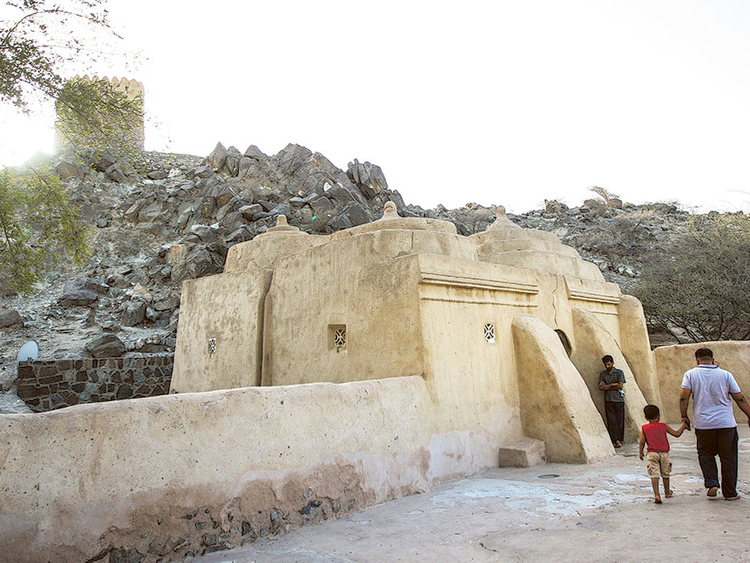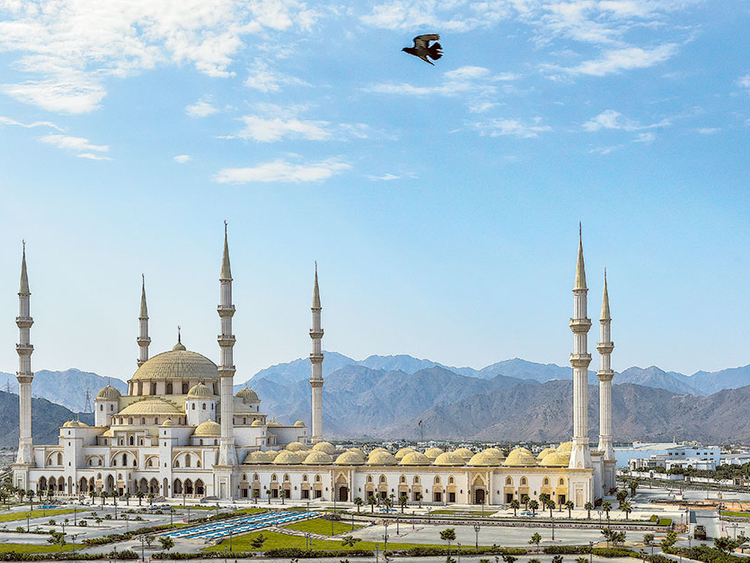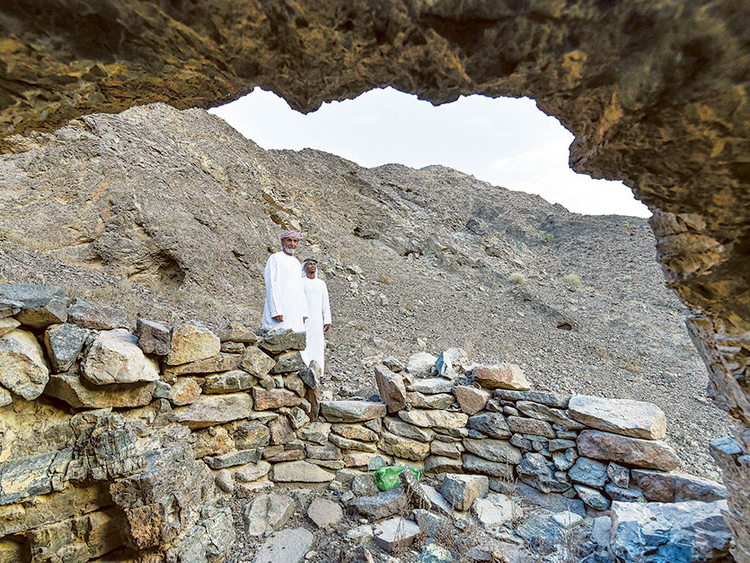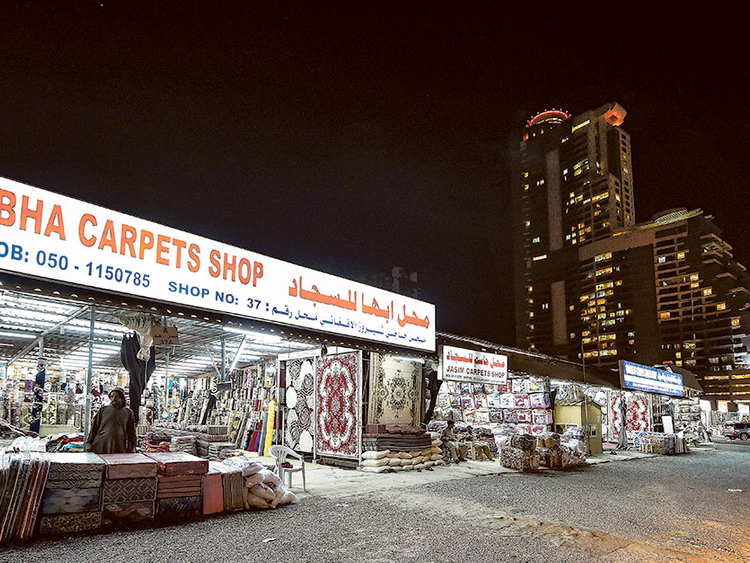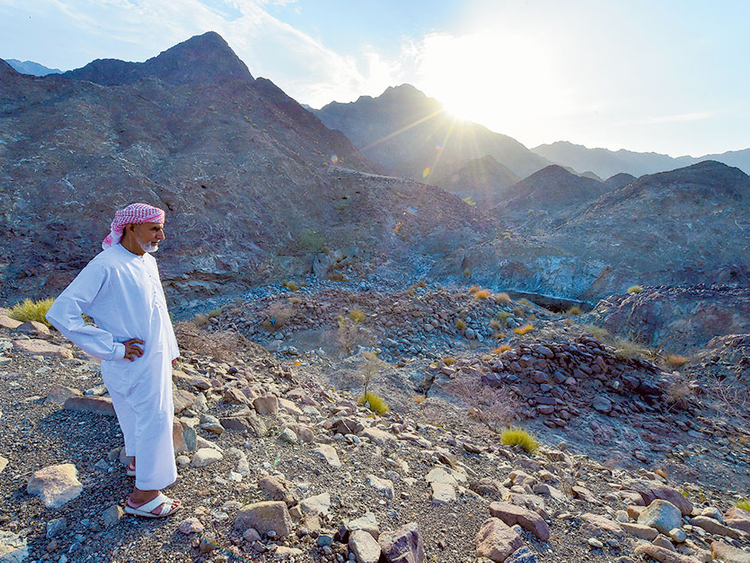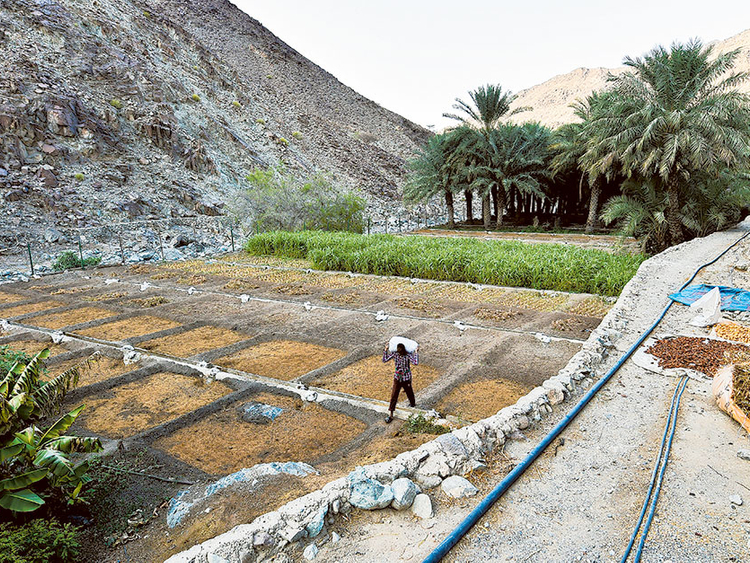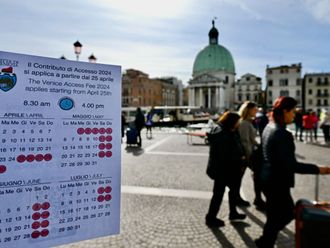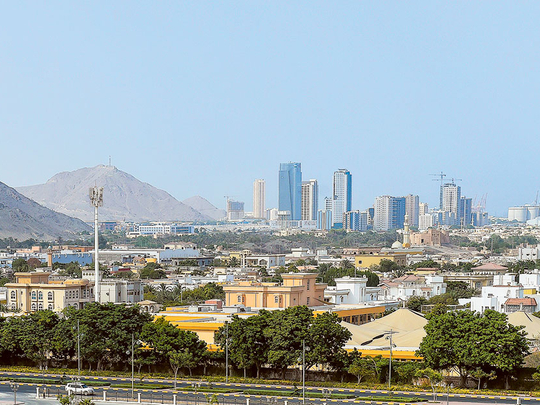
Fujairah: The only emirate on the east coast of the UAE, Fujairah, the eastern gateway to the country, distinguishes itself in a myriad ways. With more than 75 per cent of its terrain comprising mountainous range, this picturesque emirate is believed to take its name from the Arabic word for dawn, ‘fajr’.
“Fujairah emirate is unique for its combination of tranquil waters, serene desert and soaring mountains,” said Mohammad Al Afkham, director-general of Fujairah Municipality.
According to Al Afkham, this combination has put Fujairah in a select destination club that has Sharm Al Shaikh, Al Aqaba, Greece, etc, as its members. attracting more tourists in the recent past.
More than 1 million tourists visited Fujairah last year and the numbers are expected to soar.
Nestled between the rugged Hajar mountains and the fertile wadis on one side and the tranquil waters of the Gulf of Oman on the other, Fujairah also courts the legend that attributes its name to the many natural hot water springs the emirate was once dotted with.
“We have new hotels coming up almost every day to accommodate the rush of tourists,” says Al Afkham.
New shopping malls have blossomed across the landscape, including Fujairah City Centre, Fujairah Mall, Lulu Mall and Century Mall.
The emirate of Fujairah consists of two main cities — Fujairah City and Dibba — apart from villages and towns like Murbeh, Qidfa, Al Bidiyah, Masafi and Tawain.
There are more than 80 small villages spread across picture-postcard-pretty mountains and valleys.
The infrastructure is growing in leaps and bounds as apart from new malls and hotels, new roads have been built and more are under construction, while many other modern facilities like parks, schools and colleges have started to give the city a new look.
The emirate has also seen a rapid growth in population over the past decades, from around 100,000 people in the mid-1990s to 215,000 last year.
The growth in population has also seen a shift in ratio, with the expatriate population now standing at 130,000.
This has a direct bearing on Fujairah’s plans to expand its airport as well as accentuate development and offer a greater volume of amenities.
“As more tourists are coming in, we are planning to start an open bus tour soon,” said Al Afkham. “The tour will link the tourist hot spots from the Fujairah Fort to Dibba, Bidiya Mosque, Wadi Wuriayah, Friday Market in Masafi and many other places.”
However, while development will stay in step with the times, the authorities are firm on the fact that the essential charm of Fujairah that is gifted by nature and its delightful rural idyll will not be impacted in any way.
“A lot of people in Fujairah want the emirate to maintain its quiet, tranquil character and, as administrators, we are aware of its unique character and we don’t want to lose it. Our idea is to promote a relaxing, soothing environment with a mix of nature and old world charm which is just an hour’s drive away from the hustle and bustle of the modern world,” said Al Afkham.
With the recently opened Shaikh Khalifa Bin Zayed expressway, Fujairah is just an hour’s drive from Dubai and Sharjah. Add to this the eventuality of a hyperloop (a multibillion dollar high-speed 127km commuter tube from Dubai to Fujairah) that could be built at some point and which could cut down travel time between Dubai and Fujairah to 10 minutes and the possibilities take on a new dimension.
“Fujairah is a small town with modern amenities. Our beaches and wadis offer people ideal weekend getaway spots. There is no noise, no pollution, no traffic and no parking issues. It doesn’t take more than 10 minutes on an average between two destinations in the city, so this is a perfect place to come and relax,” Afkham says.
A burgeoning economy
This appeal has been only growing with the passing decades. Fujairah has been witnessing a definite shift in its economy.
With its rocky and mountainous terrain holding abundant natural resources, quarries have sprang up, mining for marbles, gypsum and other raw materials that are not only locally used but are also exported.
Other industries like block factories, cement plants, ceramic and tile industries have registered tremendous growth.
Traditionally known as the fruit basket of the UAE, with its abundant water sources and fertile land helping cultivate fruits and vegetables all year round, modern techniques have given agricultural activities in Fujairah a greater push.
“Historically, Furjairah was an agricultural and fishing society. Most people sustained themselves through farming and fishing. People would go fishing early in the morning and in the afternoon, they would work on their fields. Since the formation of the union, there has been a shift towards industry, but agriculture has also received a greater focus,” said Mohammad Bin Majed Al Aleeli, director General of Fujairah Department of Industry and Economy.
Fujairah receives a good amount of rainfall, which makes water available for agriculture and the land in the valleys is fertile. With the mountainous topography, there is also an abundance of groundwater.
The vegetable and fruit produce in Fujairah is impressive. “Apart from dates, seasonal vegetables, lemons, tomatoes, cucumber, oranges are commonly cultivated. Greenhouses have also have received a major boost,” added Al Aleeli.
Local populations in the mountain villages are involved in animal husbandry and poultry farming, with Fujairah having one of the largest poultry and dairy farms in the UAE.
But what has single-handedly driven Fujairah’s economy is its port and oil terminal.
Established in 1982, the Port of Fujairah has been expanding every year, but towards the turn of the century, the port along with the fortunes of Fujairah saw a major shift.
“With the establishment of the oil terminal and bunkering facilities, Fujairah took a new direction, taking advantage of its strategic location. The location of the port outside the strait of Hurmoz, gave Fujairah a strategic advantage and the fact that Port of Fujairah is one of the few natural deep water ports also helped,” said Al Aleeli.
The bunkering began at a small scale during the Gulf War and in the recent days the Fujairah Oil Terminal has seen a massive expansion.
“Due to the booming bunkering industry, the ship chandelling industry has also been established. Fujairah is now considered one of the largest and the best bunkering and oil storage hubs in the world,” he added.
The port now has specialised terminals for cargo, oil as well as building and raw materials like stone aggregates.
An oil pipeline runs across the UAE from Habshan in Abu Dhabi to the Fujairah Oil Terminal.
“Abu Dhabi is pumping most of its oil through Fujairah, and this is saving time and insurance for the oil companies. Instead of going through the Arabian Gulf and Strait of Hurmoz, they can ship the oil from the Fujairah terminal straight into the Arabian Sea and Indian Ocean,” said Afkham.
And these developments are bringing benefits to the local population in terms of business and jobs.
He added: “Fujairah is one of the smaller emirates, so the oil terminal and the expansion of port has created bit of a buzz. It is bringing in more people, which obviously means more business for the emirate. In fact, the whole country is benefiting from it, it’s part of the national GDP. It is the driving force of Fujairah’s recent development.”
Adventure tourism
“Marine tourism is one of the fastest growing markets [in Fujairah],” said Ahmed Ebrahim Al Beloushi, managing director, Fujairah International Marine Club.
“We receive both types of visitors, those seeking thrills or others wishing to enjoy a quiet time. We have facilities for both. Nature has given Fujairah a unique topography which allows people to pursue adventure sports here as well as have a quiet time. With Fujairah’s natural gift like the depth of the water, temperature and other natural settings, we have it to cash in on the boom,” he said.
He added that the marine life in the Gulf of Oman, where Fujairah is situated, is completely different from that of the Arabian Gulf.
“We receive both types of visitors, who are either here to seek thrill or have a quiet time. So we have facilities for both. Nature has given Fujairah a unique topography which allows people to pursue adventure sports as well as quality downtime,” said Al Beloushi.
The marine club offers sailing, powerboating, diving, snorkelling as well as fishing facilities.
“Many people also visit wadis and springs, especially during winter when it rains. The wadis also offer mountain biking and trekking opportunities,” said Al Beloushi.
Yelyeli
One of the abiding attractions for visitors to Fujairah is to be able to observe the traditional way of life of its locals in the shadow of the stunning mountains. “There are still dozens of villages in the mountains where people live in the traditional way through farming and agriculture. Though the government helps them with jobs and other facilities, the locals love to stay in their ancestral land,” said Humaid Abdullah Al Yelyeli.
A retired army officer, Al Yelyeli lives, along with 50 odd families of his tribe, in his ancestral village of Wadi Al SAHM, a 30-minute drive from Fujairah City.
“This is where our forefathers lived and died and we can’t leave this place. There is no better life than the quiet, peaceful time we have here,” said Al Yelyeli, speaking to Gulf News at his sprawling date farm.
Though most men in the village travel to the cities for government jobs, they return in the afternoon to their homes and fields to carry on with their age-old traditional way of living.
In dozens of villages like Wadi Al SAHM, older men, after early retirement, take to farming, said Al Yelyeli.
“This is our heritage and culture and this is where we feel at home, not in the cities. Mountains and wadis are our home and we want to pass on this love for the land to our younger generations,” he said.
There are no schools, supermarkets or hospitals in the village, but a high quality road connecting the new Fujairah expressway winds itself all the way to the edge of the village.
“We actually don’t see too many crowds in this place. All the facilities we need are available just few kilometres away in the city. We can drive to the city for any emergency and for necessities just like our forefathers used to do,” he said.
Timeless charms of Fujairah
Bullfighting
One of the traditional sports synonymous with Fujairah is its weekly bullfighting bouts. Adopted from the Portuguese, who colonised Fujairah for a short period, bullfighting is a popular spectacle in the emirate.
However, unlike in Portugal and Spain, bullfighting here is less about bloodletting and more about the animal’s strength and the owner’s pride. Every Friday afternoon, hundreds of people gather around a ring facing the Fujairah Corniche, some visiting from as far away as Dubai or Abu Dhabi to witness ferocious fighting or headbutting.
The winners and losers are decided depending on which animal backs out first.
Bidya Mosque
The oldest known mosque in the UAE, Al Bidya Mosque is located about 35 kilometres north of Fujairah City on the coastal road to Dibba. Thought to be one of the oldest surviving structures in the country, the mosque dates back to 1446AD. Representing a unique architectural design, the mosque is also known as Ottoman Mosque and is a popular tourist destination. Recently restored to its original glory, the roof of the mosque has four domes that are supported by one central pillar. A walled courtyard offers an entrance to the mosque through double-winged wooden doors.
Friday market
Located on the old Fujairah-Sharjah highway, outside Masafi village, the Souq Al Juma or the Friday Market is a popular tourist destination also thronged by local villagers for their regular shopping.
Though it is known as the Friday Market, it is open seven days a week. Last year, in May, a large fire gutted this market and as many as 13 shops were destroyed in a fire that started on May 31.
The market offers a wide range of products like locally produced fruits, vegetables as well as plants, toys, furniture and carpets. It is also famous for locally made pottery, earthenware, souvenirs and plant nurseries.
New highlights
Shopping malls
New shopping malls have opened over the last couple of years, including Fujairah City Centre, Fujairah Mall, Lulu Mall and Century Mall.
Shaikh Zayed Mosque
The Shaikh Zayed Mosque is one of Fujairah’s newest landmarks. An edifice that welcomes visitors as the enter the city through the new expressway, the Ottoman-style mosque is an Islamic architectural masterpiece.
The mosque can accommodate 32,000 worshippers, making it the second largest in the country, after its namesake in the capital.
Built on an area of 22,000 square metres, the mosque features 35 domes and six minarets that rise up to 100 metres and opened last year at the time of Eid Al Adha.
Numbers
- Population: 215,000
- Expatriates: 130,000
- Emiratis: 85,000
- Area: 1,166 square kilometres
- Number of hospitals: 7
- Number of schools: 23
- Number of malls: 6
Fujairah residents speak
Shah Roz, Afghan, businessman
“When I came here in 1995, Fujairah was a sleepy town with mostly locals living here. There were no big towers that you see today and neither were there any malls. There have been some rapid changes over the last five-six years. The Fujairah Souq facing the Corniche was a weekly affair, now it is permanent. There were fewer expats here, now I think there are more expats. Life used to be slow and easy, it is still easy compared to other emirates but now there is also a liveliness. Fujairah has been a blessed land for me and the government has been kind. I set up my small business in the late ’90s and now own 12 shops selling carpets, blankets and other items.”
Mohammad Hamza, Indian, Imam
“I have lived in Fujairah for 36 years. When I came here in 1981, Fujairah was no more than a village. There were fewer expats. Many Emiratis here were still leading a traditional way of life. Most people would go fishing or work on the fields. Agriculture was common. There was not much in terms of business and education. There were a couple of schools set up by the government of Kuwait and a hospital. Local people went to Kuwait and Egypt to study and work. There were no proper roads even. The trip from Fujairah to Dubai used to take us four-five hours. Some of the locals used to run transport services in their Land Rovers and we used to travel with them. The mountain journey would be more difficult than the flight we would take from India.”
Shahgul Baloch, Pakistani, businessman
“In the past 15 years that I have been here, Fujairah has taken a giant leap. There has been a lot of development and life has become easy. There is more business now as more people, especially tourists, keep coming. We are getting a lot of customers from Oman as well. I would prefer Fujairah over any other emirate. The cost of living is much lower here, which makes life easy for people with very modest means and middle class income. Also, there are no additional expenses like parking fees and there is not much traffic. This is a great place for someone who wants to lead a quiet life amid beautiful surroundings.”


